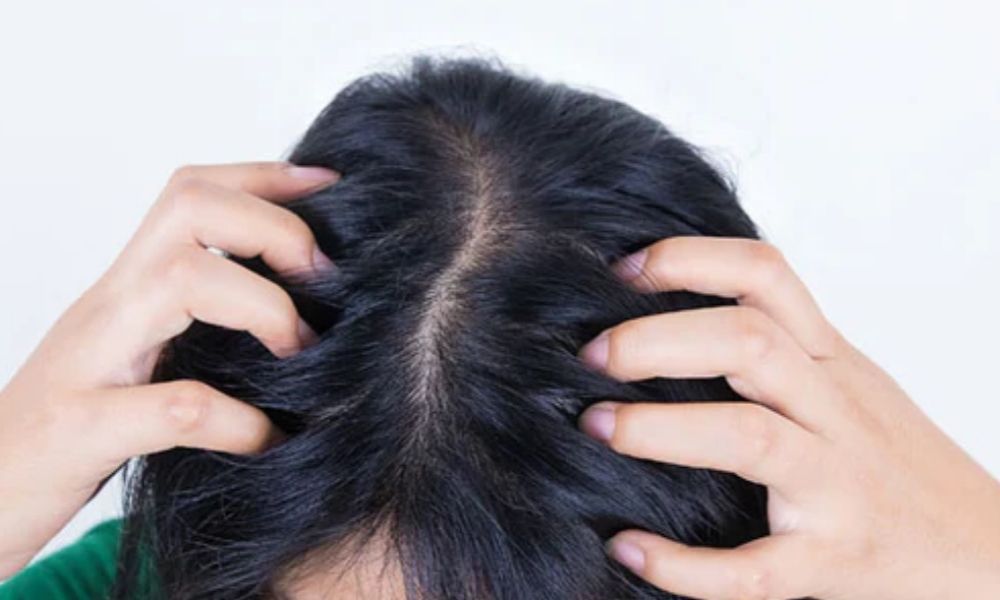Dry Scalp Treatment

Dryness on the scalp can lead to discomfort and flaking. Even with intense personal care methods, you may find yourself experiencing this, leading you to a bad hair day. Even worse, it might turn into a condition that lasts for long periods if not immediately taken care of; that’s why it’s essential to address dry scalp instantly. Good thing, there are many easy ways you can treat and prevent this!
Wash Your Hair Thrice a Week
Washing your hair regularly helps remove dirt, oil, and product buildup that can contribute to scalp dryness. Use a mild shampoo and avoid hot water, as it can strip your scalp of its natural oils. Overwashing can also exacerbate dryness, so aim to wash your hair about three times a week. This frequency helps maintain a balance, keeping your scalp clean without stripping away too much of its natural moisture. Additionally, choosing a shampoo specifically formulated for dry scalps can provide extra hydration and nourishment.

Use Pili Oil as a Hair Mask
As necessary as it is to control oil production in the hair, it remains important to keep it nourished and moisturized. The use of Pili Oil has been proven to help keep hair smooth and soft to the touch. One way of using it is by applying it to your roots and ends, leave it for about 30 minutes, and then wash out with shampoo. You can also leave it on overnight for thicker hair! Pili oil is rich in fatty acids and antioxidants, making it an excellent natural moisturizer. Try Merle’s Pili Oil for an all-local ingredient and multi-use features. Regular use of pili oil can improve hair texture and scalp health, reducing dryness and flakiness over time.
Avoid Harsh Products
Everyone comes to a point of experimenting with new and different products to achieve the standard silky soft hair. But it’s important to understand that our bodies oftentimes do not need too high of a maintenance to be its best; sometimes, less is more. Many commercial hair products contain harsh chemicals that can strip your scalp of its natural oils and exacerbate dryness. Opt for natural or organic hair care products that are free from sulfates, parabens, and alcohol. These ingredients can be drying and irritating to the scalp. Instead, look for products that contain moisturizing ingredients like aloe vera, coconut oil, and shea butter. Regularly conditioning your hair can also help keep it moisturized and healthy. Deep conditioning treatments once a week can provide extra hydration and repair damage caused by styling and environmental factors.
Eat Healthy
You know what they say, true beauty comes from within! A balanced diet rich in vitamins and minerals is essential for healthy hair and scalp. Include foods like nuts, seeds, leafy greens, and fruits that are rich in antioxidants and omega-3 fatty acids. These nutrients help support scalp health and promote the production of natural oils. Omega-3 fatty acids, found in fish, flaxseeds, and walnuts, are particularly beneficial for reducing inflammation and dryness. Vitamins A, C, and E, found in colorful fruits and vegetables, help to keep your scalp and hair follicles healthy. Zinc and iron, found in lean meats and legumes, are also crucial for maintaining strong and healthy hair.
Wash Your Hair with Cold Water
Hot water can strip your scalp of its natural oils and contribute to dryness. Rinse your hair with cold water after shampooing to seal the moisture into your scalp and hair. Cold water helps to close the hair cuticles, locking in moisture and adding shine to your hair. If you find cold water too uncomfortable, try using lukewarm water for washing and then a final rinse with cooler water. This simple change can make a significant difference in your scalp and hair health.
Refrain from Blow-drying
We all know how convenient it is to use a blow dryer to dry your hair. It gets the job done quickly and can even be used to style your hair. However, too much heat can cause brittleness, breakage, dullness, and dryness. To make it workable, you may use recommended heat settings that aren’t as damaging for your hair compared to high heat settings that heat up your hair above drying it. Even so, the ideal way of hair-drying method is to gently squeeze your hair with a towel and air dry it afterward. Simple, natural, and safe!
Spend a Few Minutes in the Sun Every Day
Vitamin D deficiency can lead to hair loss and scalp issues, so it's essential to get some sun exposure regularly. This can help your scalp maintain a healthy scalp. However, excessive sun exposure can damage your hair and skin, so consider wearing a hat or using hair products with UV protection if you plan to be outside for extended periods. Try spending only a few minutes outdoors each day.
Scalp Massages
As an additional measure, you can try to form a habit of massaging your scalp. Regular practice can help improve blood circulation and promote the production of natural oils. Use your fingertips to gently massage your scalp in circular motions for a few minutes each day. This can help reduce dryness and stimulate hair growth. You can also use a few drops of essential oils, like lavender or rosemary, mixed with a carrier oil for added benefits. This is best done every night before bed as scalp massages are relaxing apart from being beneficial!
Conclusion
Dryness on the scalp can be uncomfortable, but by following these scalp hydration solutions, you can effectively moisturize and nourish your scalp. Remember to maintain a regular hair care routine, eat a balanced diet, and protect your scalp from environmental factors to keep it healthy and hydrated. If you continue to experience scalp dryness despite these efforts, consider consulting with a dermatologist for personalized advice and treatment options.
Learn more about remedies for dry scalp:
https://www.webmd.com/skin-problems-and-treatments/remedies-for-dry-scalp


